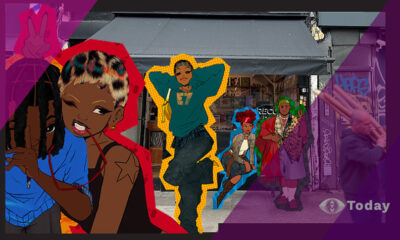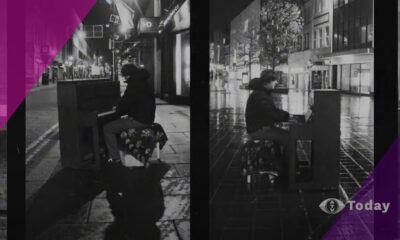
Entertainment
Toby Ealden on his Zest for Theatre
Zest Theatre has been a dynamic force in the arts sector for 17 years…
The company crafts captivating experiences across a diverse array of platforms. Their award-winning work, lauded as ‘unpretentious’ by The Stage and deemed ‘essential‘ by The Guardian, spans theatres, festivals, public spaces, schools, and digital platforms.
Zest’s journey began in 2007 following its founder, Toby Ealden, working within youth arts in Lincolnshire, laying the foundation for an organisation that would grow to national prominence and become an Arts Council England National Portfolio Organisation (NPO). Zest’s success, however, isn’t solely measured by productions; it’s about the impact on individuals’ lives as Toby explains.
How did Zest begin?
I founded Zest in 2007. At the time, I was 25 and working for a national charity as a youth arts worker across Lincolnshire. That funding came to an end, and I was made redundant. At that moment, I had a choice of either leaving Lincolnshire, where I’d lived since I was two but where there were few opportunities for me or leaving the county to where the opportunities were. I chose to stay and build something to keep me in a job whilst serving the local communities here in Lincolnshire.
Under the company name Zest, I began piecing together little jobs here and there to create an income for myself. What started as an optimistic blag has evolved over the years to become an organisation with a reach across the country.
We became a registered charity in 2011, surviving on project funding year-by-year, before joining Arts Council England’s National Portfolio in 2023.(NPO)
What has becoming an NPO meant to the organisation?
Being an NPO has given us regular core funding for the next few years. It’s provided the financial stability to expand the team and create arts jobs in Lincoln, supporting the growth and development of the cultural ecology here.
More importantly, it’s provided the capacity artistically and strategically to dream and envisage new things that benefit the lives of even more young people.
When we were running project to project, hand to mouth, and constantly veering away from the next financial cliff edge, I was continually stressing about cash flow, what was next, and when the funding was going to run out. Becoming an NPO does not mean that those problems just vanish; our funding from Arts Council England covers around 50% of what we need to cover our core costs and deliver our artistic programme, but it has provided breathing space to think more strategically about what we want to do next and, more importantly, why we do it and how we do it.
Why do you think listening to young people when creating your work is so important?
Speaking to young people has always been the crux of our process. Putting young people at the centre of the research and the development of new productions ensures that audiences see and hear themselves on the stage.
As an adult making work with young people, I have to listen to them. My experience of being a teenager was a long time ago. The world was very different from the world they live in now. To meet the needs of young people, for it to reach people, resonate with them, and impact them in the way we hope we do, we must understand how the world works for them.
As a nation, we don’t always listen to young people. We don’t make space for them to be seen, heard, and celebrated. And it’s not until they get older, get into the workplace, and get the right to vote that we begin to take their voice more seriously.
Zest creates platforms where those voices can be heard and amplified.
Zest is unusual in that it creates work directly from the voices of young people. How important is it to have their voices involved in shaping the organisation?
When the pandemic hit we realised that more than ever, young people needed to be heard across society. If we were going to amplify young voices properly as an organisation, then we should include them across the whole organisation.
Through the Cultural Recovery Fund, we established a youth advisory board that was only supposed to run for 13 weeks during lockdowns to help us rebuild the organisation after an extended closure due to furlough. This was an opportunity to reset and ask previous participants about recent projects, what Zest should be, and what young people need from us. We paid those young people as consultants, giving them access to policies and procedures and allowing them to critique our processes and interrogate our thinking.
At the end of those 13 weeks, we realised how beneficial the process had been and that it shouldn’t stop at the end of that funding round. Instead that group became the cornerstone of our whole organisation. That group remains running to this day. When you’ve got a great group of young people who are so vocal and invested, you also want to develop them just like you would with any of your staff. When we became an NPO, we enlisted seven of those young people to become a shadow board. They’ve been attending board meetings and shadowing trustees in an advisory capacity for the last year.
They have received training to help them understand the same board papers and NPO reports that our trustees receive so they can have a voice to shape the governance of this organisation. This year, we will appoint a number of them as fully fledged Trustees. Now, every big strategic decision, from programming to recruitment, includes the voices of young people.
Do you think that work for children and young people is given the respect and recognition it deserves within the arts?
The sector understands the importance of engaging children and young people in the arts. Arts Council Englands have also recognised this by increasing the number of Children and Young People’s organisations within their national portfolio by 20%.
But while everyone knows it’s a good thing, young people’s work is too often overlooked, dismissed, siloed into education, learning, or outreach departments, or deemed lower quality than professional work. Too frequently, work for children and young people doesn’t make it into main programmes when it should be front and centre.
Now, more than ever, I think it’s vital that young people get that opportunity to be creative, express themselves, be seen, heard and celebrated. At a time of continued crisis, culture and creativity provide the perfect outlet – not just to provide platforms for young voices to shape the socio-political landscape but also to boost well-being, build connections and community, be free to play and feel a sense of joy – even if it’s momentary.
Zest gets involved in much more than just producing theatre. Why is that?
The pandemic made us pivot, at the end of the day we didn’t know if theatres would ever open again, and as a charity, our mission is to make space for young people to be heard and to amplify their voices.
With theatres closed, our Refresh Lincoln project was a city-wide installation that transformed the words of local young people into 80 artworks across the whole city. Our venture into public art was supposed to be a one-off but was hugely successful and has since led to 9 other versions of that project across the country. By treating city centres as a canvas, we can invade public space with the unheard words of young people to bring colour and conversations to local communities through culture. What began as a pivot has now become a central part of our programme because the reach and impact of the work are massive!
What is the best project you have been most proud of?
I find it hard to answer that question because we’ve created so much work over the last 17 years. There have been so many joyful moments of celebration, pride, and so many individuals that that work has impacted. There are some individual young people who have overcome real challenges with the help of Zest’s input in their lives. So when I think of my proudest moments, it’s not necessarily the productions or projects I think of; it’s the impact that it’s made on those individual people.
You tend to deliver your work in areas that are often overlooked. Why is that?
I grew up in Lincoln – a small city in the middle of a vast rural county that always felt forgotten and overlooked. There are places like Lincolnshire all over the country that have been underfunded, undervalued and under-served.
My work at Zest has always drawn me to places where young people might be experiencing a similar story. In terms of theatre, I remember seeing shows featured on TV and then feeling disappointed when Lincoln didn’t feature on their tour schedule. But why shouldn’t people see the highest quality work of national importance in their home town? I think I’ve subconsciously focused on these areas because I feel an affinity and a connection to those communities. But also, those are parts of the country where there is the greatest need and where this kind of work can significantly impact people who needed the most.
Do you think that young people are being overlooked too?
Young people are massively overlooked. According to NHS data, 1 in 6 young people are facing a probable mental health condition at this time. That’s up from 1 in 9 in 2017. Young people are facing a mental health crisis. And yet, nobody seems to give that crisis the attention it needs and deserves. Young people have experienced vast changes and a series of crises in their short lifetimes. They’re not immune to the challenges of the cost of living crisis, the effects of the pandemic, or the impacts of Brexit on the country. They’re all too aware of the climate emergency and the climate anxiety that crisis illicits.
There’s been an erosion of public services for young people. Across the country, 750 youth centres have closed in the last 12 years, and 4,500 youth workers have been cut. This is against the continual increase in expectations and pressure from the changes to the education system. They’re the first generation to have mobile phones in the palm of their hands from a very young age, with access to the world’s knowledge at the tap of a screen. Young people have never been more connected to the rest of the world and yet felt so isolated. They have had to grow up faster than we ever had, and we wonder why there’s a rise in anxiety and depression.
Too often, I hear adults and commentators solely blame the state of young people’s mental health on them being ‘glued to their phones’ when there’s a whole global picture that’s contributing to their anxiety that nobody is acknowledging – social media is just a texture.
In today’s world of Tech and TikTok, is there a place for arts and community?
100%! Social networks and mobile technology were created to make us feel more connected to each other and the world. However, with the subtle shift of social networks becoming social media, content has become king, and the intention to create connections has been lost. I don’t think social media has to be seen as bad; there are so many benefits. Young people now have access to the world, a world of knowledge in the palm of their hand. Never has a more politically, socially, and culturally aware generation existed.
But many young people tell us they seek opportunities to put their phones down and reconnect with the world. The young people here in Lincoln explained how they wanted genuine moments of connection with their friends, family, and loved ones and how those relationships are often complex to manage. That’s where community and culture can come in – to create those moments of unity, celebration, and sharing.
How important do you think organisations like Zest are in today’s society?
In our current society, charitable and third-sector organisations, like Zest, are plugging the holes in the gaps of public services.
Here in Lincoln, young people are desperately needing dedicated spaces to exist. As artists and creatives, we have developed the skills and the vision to co-design incredible spaces for young people. So this summer, we’re doing precisely that and opening a new touring youth facility for the young people of Lincoln to have a place that’s theirs where they can be seen, heard, and celebrated. It shouldn’t be this way. Public services should exist to enable everybody across the community to thrive, not just survive. But today, organisations like Zest are stepping up because if we don’t, who will?
To find out more about Zest Theatre and upcoming projects, visit www.zesttheatre.com










